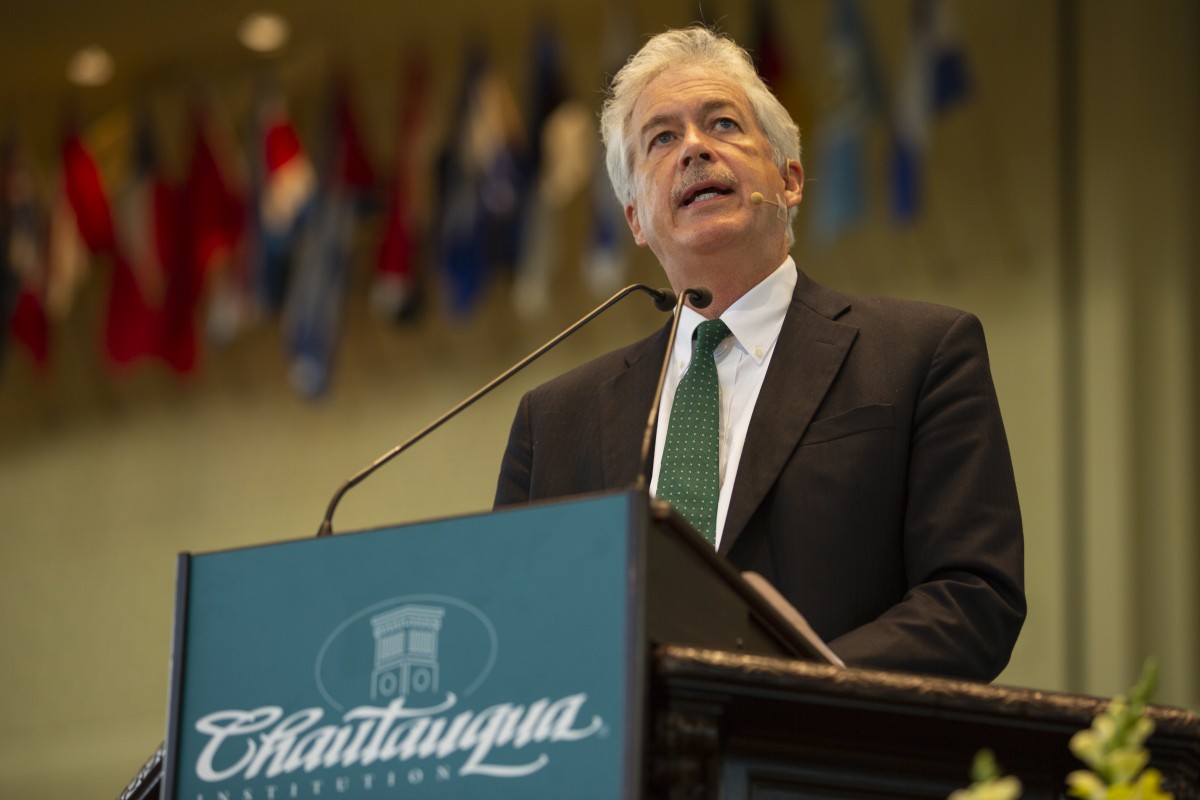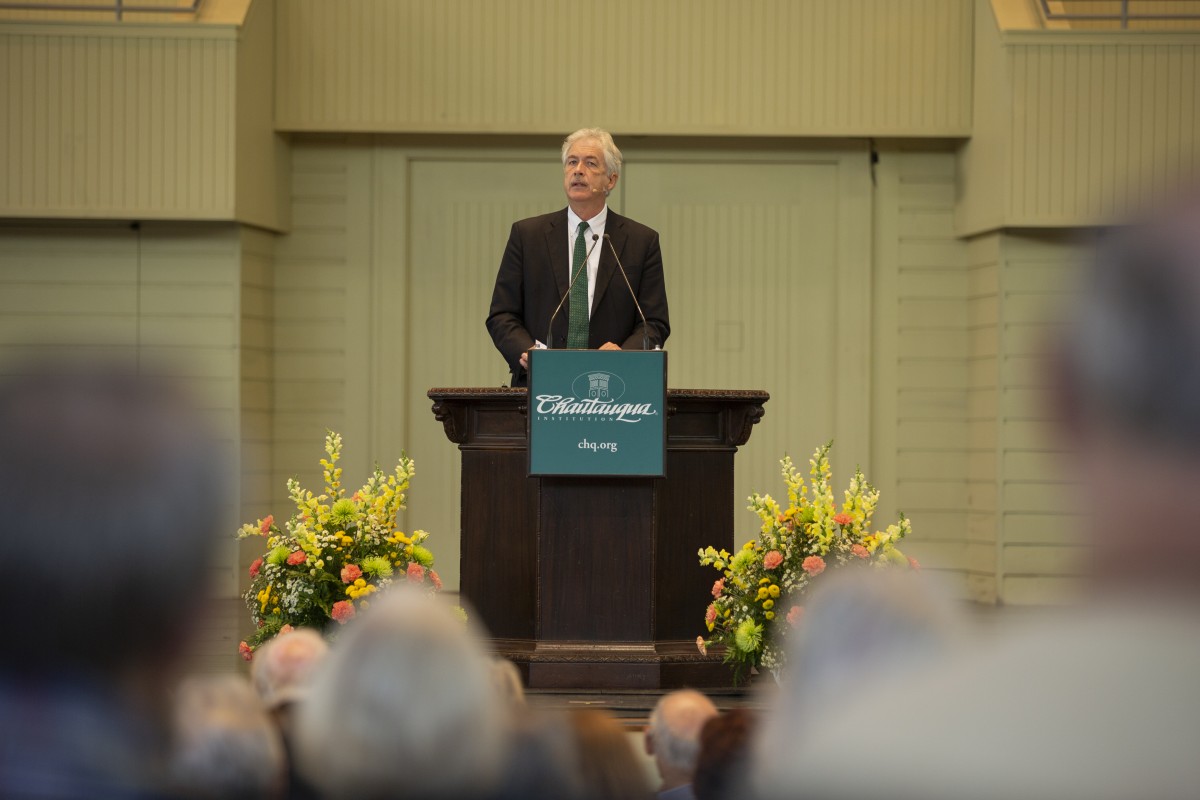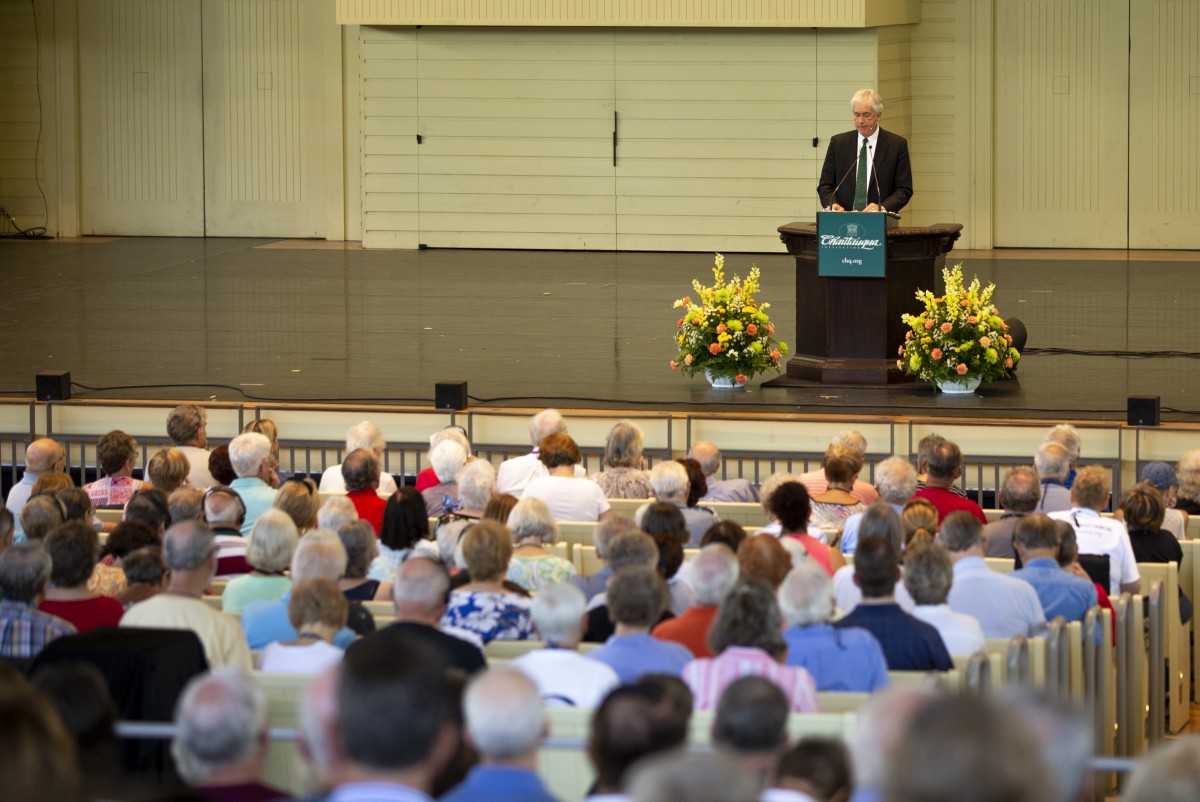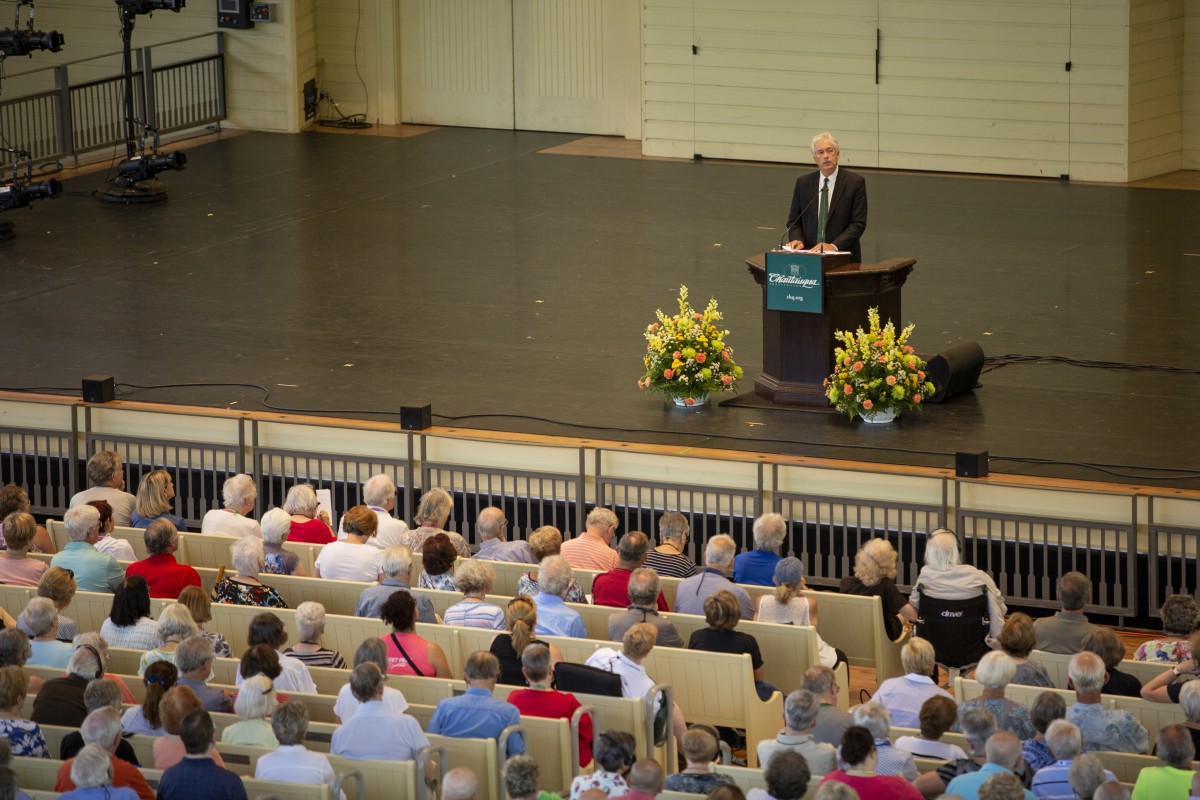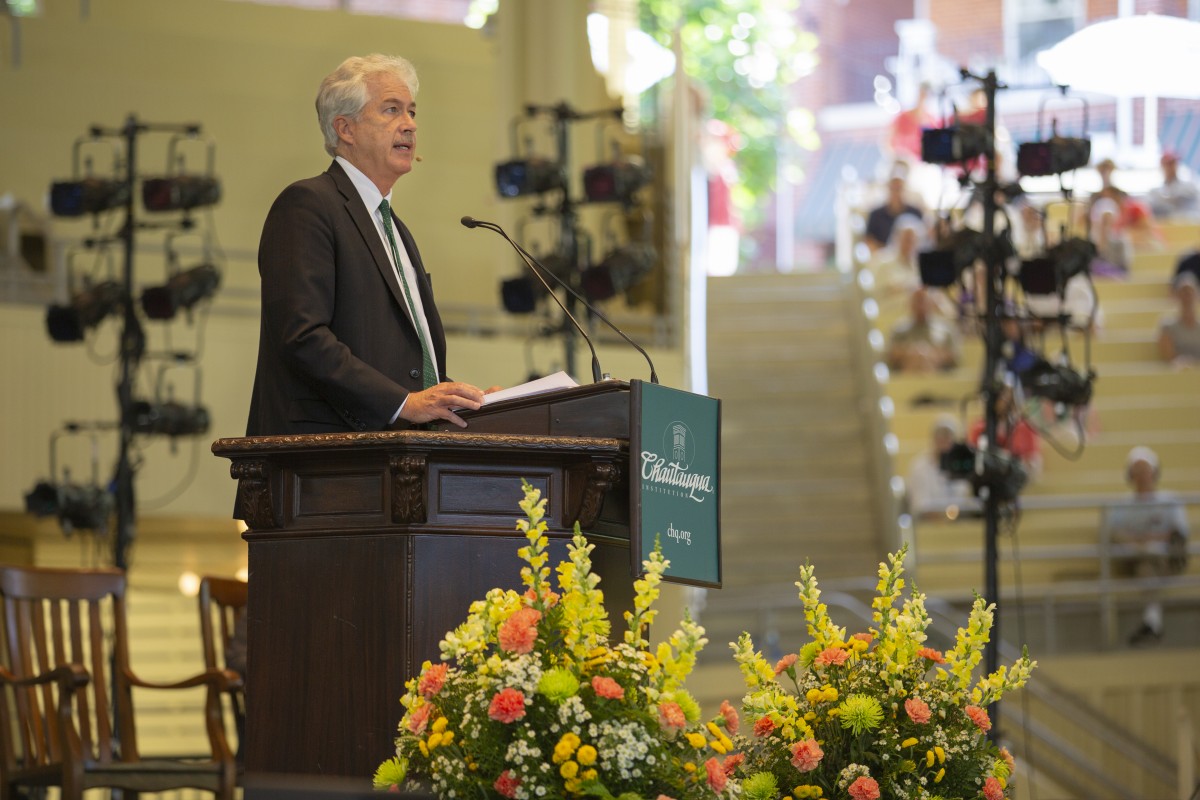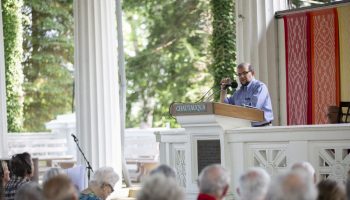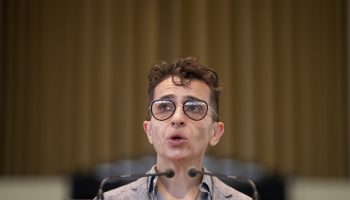William J. Burns offered a “recovering diplomat’s” perspective on detangling the U.S.-Russia relationship at the 10:45 a.m. morning lecture Tuesday, July 17, in the Amphitheater, continuing Week Four, “Russia and the West.”
Burns served as U.S. Ambassador to the Russian Federation from 2005 to 2008 and as U.S. deputy secretary of state from 2011 to 2014. He is the second serving career diplomat in history to become deputy secretary of state; he holds the highest rank in the Foreign Service, career ambassador. Burns currently serves as the president for the Carnegie Endowment for International Peace.
He provided context to the countries’ complicated history, offered observations on the Helsinki summit and prescribed a framework for a future relationship between the superpowers.
“The United States has oscillated between visions of endured partnership with Moscow and dismissing it as a sulking superpower in terminal decline,” Burns said. “Russia has moved between motions of strategic partnership with the United States in the immediate aftermath of the Cold War, and a bigger, deeper desire to upend the current international world, where a dominant United States confines Russia to a subordinate role.”
This oscillation of the countries’ positions on the world stage is at the heart of their tensions, Burns said, beginning with the Cold War, which brought the U.S.-Russian relationship “to the lowest point in a quarter-century.”
“There are those that say the West did not do enough to help Russia get back on its feet, that there was too much shock and too little therapy as Russia wrestled with a market-economic reform after the Cold War,” he said, “that the expansion of NATO membership needlessly put salt in Russian wounds and that we showed too little benignity in victory. There are those that argue it was too much, and we were naive to think that Russians could ever overcome the humiliation.”
While speculation about “who lost Russia” is vast, Burns stressed that “Russia was never ours to lose,” and that the United States’ policy was not always enough — or right.
“Russians lost trust and confidence in themselves after the end of the Cold War, and they eventually had to remake their space and their economy,” he said. “As the 20th century wound to a close, Russians had been through generations of privation, loss and tragedy. None of that could be fixed in a single generation, let alone a few years — and none of that made the task of diplomacy any easier.”
Burns experienced the mammoth undertaking of policy in Russia when he served as chief political officer at the U.S. Embassy in Moscow during the mid- 1990s. At the time, Burns described Russia as an “erratic mix of hope and uncertainty,” with a “just as erratic” leader, Boris Yeltsin.
When Burns arrived in Russia’s capital city in 1994, the country was undergoing three drastic transformations: the collapse of communism and the introduction of a market economics, the collapse of the Soviet bloc and the collapse of the Red State itself. These transitions did not fare well for Russia’s economy or society, Burns said.
Industrial production dropped by half, and agricultural production was declining;mass inflation wiped out the nation’s savings, and 30 percent of the population was living below the poverty line; the public health system collapsed, which caused the rise of contagious diseases; and unlawfulness was rising — it was not uncommon to see people roaming the Red Square in broad daylight with a rocket-propelled grenade, Burns said.
“Nothing — nothing had captured more vividly how far Russia had fallen since the collapse of the Soviet Union than the serial humiliation and suffering during the First Chechen War,” he said. “Here in winter of 1994 and 1995 were the ill-fed and ill-trained remnants of the Red Army, once reputed to be capable of reaching the English Channel in 48 hours, (who) now weren’t able to suppress a local rebellion.”
The Russian government assembled a rag-tag army made of teenagers, hardened soldiers and contract killers, and reverted to leveling most of the Chechnya region, destroying homes and killing thousands of civilians. This mass execution marked the end of the United States and Russia’s “post-Soviet honeymoon,” Burns said.
President Bill Clinton worked to manage Russia “post-traumatic stress syndrome,” while cautious of its potential return to authoritarianism. Clinton tried to bring Russia to the table — inviting it to join the G-7 and attempting to forge a new relationship with NATO, Burns said.
“From Russia’s perspective, it was getting none of the respect it deserved as a major power,” he said. “When I left Moscow in 1996, I was worried about the eventual resurgence of a Russia once cocky, cranky, aggrieved and insecure. I just had no idea it would happen so quickly or that Vladimir Putin would emerge as the embodiment of that futilely Russian combination.”
Nearing the end of his life and legacy,Yeltsin groomed Putin for the presidency. Despite being the younger, hard-faced and coldly calculating “anti-Yeltsin,” Putin’s passion for control and “unwavering mistrust” was promising for chaotic Russia — he was determined to “make Russia great again,” Burns said.
“The Russia Putin inherited was full of troubles; the economy had sunk again into turmoil,” he said. “In the August 1998 economic crisis, the stock market crashed, the government defaulted and the rule book collapsed. As a result, unemployment and inflation soared, gross domestic product contracted by nearly 5 percent, and agriculture dropped half from its Soviet-era high.”
By the end of his first term, however, Putin had restored the economy. By 2005, Russia’s economy was, at face value, impressive — GDP was growing and unemployment rates stabilized, Burns said. This boom boosted Putin’s popularity, which made way for his new political order.
“His obsession with order and control and restoring the power of the Russian state was abundantly clear and wildly popular,” Burns said. “His formula was straightforward: revive the state and get authority of politics, media and civil society, regain control of Russia’s source of national wealth — its abundant natural resources — and rebuild Russia’s prerogative as a great power and reinstill its entitlement.”
Putin’s view of the United States was one of suspicion, which he tested early on in President George W. Bush’s tenure when he approached Bush with a partnership for the war on terror — Russia would back U.S. efforts and vice versa. Putin’s ideal deal meant the United States would avoid Russian affairs completely.
“As Putin quickly learned, however, this kind of transaction was never in the cards,” Burns said. “Putin fundamentally misread American interests and politics. From Washington’s view, there was no desire and no reason to trade anything for Russian partnership.”
According to Burns, Putin also misunderstood U.S. political behavior, often misconstruing policies and connecting non-connecting dots as some conspiracy against Russia. The Orange Revolution in Ukraine and the Rose Revolution in Georgia led Putin to believe the United States was“undercutting Russia’s interest in its presumed sphere of influence” and that the United States may force a revolution upon it.
“These disappointments were piled on top of (Putin’s) anger over the Iraq War, the symbol of America’s predilection for unilateral action in a unipolar world,” Burns said. “Putin believed that President Bush’s freedom agenda included Russia near the top of the administration’s ‘to-do- list.’ Democracy promotion, in Putin’s eyes, was a Trojan horse designed to harbor American geopolitical interests at Russia’s expense.”
With the fade-out of Bush-era tactics, President Barack Obama strived for “a reset” of the U.S.-Russia relationship. His attitude was pragmatic, Burns said. Putin did not object to a reset, and during Obama’s first years in office, there were sizable “accomplishments” made by the two superpowers.
“(Obama) understood that he would be operating with what would likely be a relatively narrow band of possibilities with Russia, from the constructively competitive to the sharply adversarial,” he said. “But Obama wanted to test the proposition that a more stable relationship was possible and that it would help with other items on his political agenda.”
However, it became difficult to maintain the relationship, especially with minimal economic gains on either side. The “reset” died with Russia’s 2014 invasion of Crimea. With an again-tangled relationship, Putin saw an opportunity to “sow chaos in our political system” in the 2016 election.
“He succeeded beyond his wildest imagination,” Burns said. “It was all part of a pattern, in which Putin continued to demonstrate that declining powers can be at least as destructive as rising powers. He was convinced … that he could play strongly with weak cards, especially against poor players with stronger hands.”
This led Burns to his observations of Monday’s Helsinki summit between Putin and President Donald Trump; while Burns thought that the meeting between the two heads of state was “a good idea,” he thought the events of the summit were those of “poorly conceived diplomacy.”
“Diplomacy is not just about getting along — it’s about advancing tangible American interests; diplomacy is not just about dialogue, untethered to history or strategy; diplomacy is not just about winning, especially with Vladimir Putin, who rarely wins anything,” Burns said. “President Trump’s concluding press conference was the single most embarrassing performance by an American president on the world stage that I’ve ever seen.”
Based on the events of the summit and the United States’ history with Russia, Burns went on to advise a framework for the relationship moving forward — he stressed that “pageantry” is not the trajectory for change.
His framework involved five suggestions: to translate the summit into rules for the countries’ bilateral relationship; to discuss the role of nuclear weapons in the United States, Russia and across the world; to bolster security against Russian threats; to work together to resolve conflict in the Middle East; and to have systematic conversations about Asia.
“Managing relations with an adversarial Russia will be a long game,” Burns said. “We should not give into Putin, but over the longer-term we should not give up in Russia. We have a strong hand to play. … Managing great power and rivalry is what diplomacy is all about.”
After the conclusion of Burns’ lecture and a thunderous round of applause, Chautauqua Institution President Michael E. Hill opened the Q-and-A by asking if there are any tactical things the United States can do to get Putin to come to the table with a different attitude about interference in U.S. affairs, which Burns said is “unacceptable.”
“The message needs to be extremely direct … that the administration is going to rigorously enforce the sanctions that are already in place and that if this kind of interference continues … the president will work with Congress to increase those sanctions,” Burns said.
Hill then asked a question submitted via Twitter: “Do you believe Russia influenced the vote in Britain to leave the EU?”
“I strongly suspect it,” Burns said. “It would certainly be consistent with the Russian government’s behavior to look for ways in which they can sow chaos, not just in the United States, but in western Europe, and what better way to do that than to encourage a positive Brexit vote?”
An attendee asked what Burns speculates happened behind closed doors at the Helsinki summit. Burns said Putin likely played to Trump’s ego, complimenting him on his economic and political strides thus far.
Another audience member asked what advice Burns had for Congress, specifically Sen. Chris Coons, who lectured Monday, July 16.
“I’ve learned over the years that most people in Congress don’t appreciate free advice from recovering diplomats,” Burns said. “And Sen. Coons doesn’t need (advice) from me. I do think, however, that it is really important, especially for the U.S. Senate, to play a responsible role — to play the role the Constitution set out (to do).”


